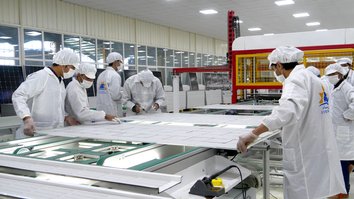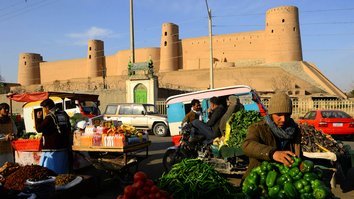HERAT -- The number of factories and jobs in Herat city is growing at a rapid pace as the prospect of lasting peace in the country spurs investments in the region's production facilities.
The COVID-19 coronavirus outbreak in Herat has slowed down the pace of this growth in the past few weeks, and will likely extend for some time, but in general the economic outlook for the region is strong, say observers.
Twenty-five factories started operations in Herat Industrial City during solar year 1398 (2018-2019), according to the Herat Chamber of Industries and Mines.
These enterprises produce items such as food, medicine, medical supplies and carpets.
![Workers at a soap factory can be seen in this photo taken March 25 in Herat Industrial City. [Omar]](/cnmi_st/images/2020/04/20/23617-s_2-585_329.jpg)
Workers at a soap factory can be seen in this photo taken March 25 in Herat Industrial City. [Omar]
![Workers fill bags with flour at a flour mill in Herat Industrial City on March 25. [Omar]](/cnmi_st/images/2020/04/20/23618-s_3-585_329.jpg)
Workers fill bags with flour at a flour mill in Herat Industrial City on March 25. [Omar]
About 20 additional factories are scheduled to open as soon as they are connected to electricity, said Hamidullah Khadem, director of the chamber.
"We're opening them to reduce imports from neighbouring countries, especially from Iran, and to create an opportunity for Afghan exports to increase," he said.
The increase in the number of factories in Herat has lowered imports as well as dependence on foreign goods, he added.
"There has been about $50 million (3.8 billion AFN) invested in 25 new factories in Herat in the past year," Khadem said. "About 20 more with a total investment of $35 million (2.6 billion AFN) are expected to open in the near future."
The 25 newly opened facilities at the industrial city will create 6,000 direct jobs and more than 10,000 indirect long-term positions, he said.
"Non-alcoholic beverages, dried fruit, dishes, yarn and medical supplies are among the products that we export," said Khadem. "Products worth $20 million (1.5 billion AFN) were exported from Herat Industrial City in 2019."
"There are 330 factories at the park," he added. "They have directly employed more than 25,000 workers -- with more than 25% of them women -- and provided indirect jobs for tens of thousands more."
Outside investors interested
Many Afghans remain optimistic that a lasting peace in the country is possible even as continual attacks by the Taliban have raised doubts among Afghans about how serious the militants are about peace.
The group has killed scores of security personnel since a pact with the United States was signed on February 29.
The prospects of an end to the 40-year-old war in Afghanistan have encouraged investors to expand their businesses, said Younus Qazizada, director of the Herat Chamber of Commerce and Industries.
"Large and valuable production facilities have opened in Herat Province in the past year, and this process continues," he added. "Many businesspeople are looking at purchasing land and building production factories at the industrial city."
At the same time, the peace prospects are attracting interest in Herat Province from investors outside the country, said Muhammad Ibrahim Sadaat, who heads a food production company located at Herat Industrial City.
"At this time, as we hear the news of peace, a number of investors are trying to expand their businesses," he said. "I even have friends outside Afghanistan who are interested in investing in Herat and serving their country in a peaceful environment."
"We're keenly waiting for the intra-Afghan talks between the government and the Taliban to bear fruit," he said. "We want to prove that Afghans, like [citizens of] many other countries, are capable of rebuilding their ruined country after war."
"We hope for peace so that we can work in a peaceful and secure environment in the future and see our investments flourish," added Sadaat. "When there's no peace and the war continues, we can't achieve anything and risk losing everything."
In the meantime, his company is ramping up production and will look to add more workers, he said.
A lasting peace is key to continuing the growth of factories in Herat, said Abdul Hakim Dostizada, director of a soap factory in the park.
"Investment is linked with security," he said. "We've seen a surge in interest in building production facilities at Herat Industrial City since talks about peace began."
"We call on the government and the Taliban to immediately start peace talks so that we can expand our activities and start working in a more peaceful environment," he added.
Government support
The government is committed to supporting domestic manufacturing and is trying to provide a better environment for the private sector to grow, say local authorities in Herat.
The government is focusing on private sector manufacturing, and without its support, that sector could not register the current level of growth, said Jilani Farhad, a spokesman for the Herat governor.
Afghanistan is responding to product dumping by neighbouring countries, and it will not permit such interference to weaken domestic production, he added.
"In recent years, the private sector has been growing with the government's support," Farhad said. "Most of the essential products needed domestically are produced at Herat Industrial City, which is considerably reducing imports from neighbouring countries."
"Most of the demands of the government and security agencies are being met domestically," he added. "It is one of the policies of the Afghan government to promote domestic production, and it has made efforts to place higher tariffs on goods from neighbouring countries."
The growth of private sector manufacturing in Afghanistan is encouraging for all Afghans, said Mohammad Yaqub Mashouf, an economist in Herat Province.
"Private sector growth and the increase of domestic manufacturing need the government's full-fledged support, and the situation at Herat Industrial City shows that the government has supported the sector," he said.
"The destructive policies of neighbouring countries toward Afghan manufacturing are still a matter of grave concern," added Mashouf. "These countries want to weaken Afghanistan's domestic production, take control of the market and sell their products at much higher prices."








If the international community wants Afghanistan to stand on its own feet, it should provide more assistance in the area of building factories in this country. If we had manufacturing factories which produced all the basic items in all provinces, we would have not faced in trouble with high prices of the products today. Prices have skyrocketed due to the closure of the gates of neighboring countries caused by the outbreak of corona virus. Our compatriots are not able to buy food items. Factories should be built in all provinces of the country so that on one hand, people get hired on jobs and on the other hand, the prices remain unchanged.
Reply7 Comment
I become extremely happy to hear and read developmental and economic news on this news website. As an Afghan, I would like to ask the security and economy relevant officials to try to set up such manufacturing companies, factories, and other economic projects in districts, villages and suburbs of the cities, as they have many advantages and privileges. 1. First, the government should ensure 100% security for our investors in the districts. 2. Second, the government should provide job opportunities for the jobless youths in the districts and villages so that our youths are controlled from: sitting by the streets, harassing other people’s wives and children, drinking alcohol, gambling, committing theft and banditry, playing marbles, being addicted to drugs and doing other entertainments, which are against the Islamic and cultural principles of our society. 3. If such job opportunities are provided, our youths’ migration to the neighboring countries will reduce without any prevention. 4. Because of lack of security in the suburbs, a great number of your people migrated to the cities and left all their livestock and farming. If such factories are built, our dear and hospitable villagers will go back to their ancestral lands and become busy in the farming and livestock. 5. Population density in the cities will be reduced. And air pollution in the atmosphere of the cities will decrease as well. 6. People who are living in the cities can find jobs easily. I ask the government to ensu
Reply7 Comment
It is good news, but this is not enough. Currently we have a few factories in only Herat and Kandahar provinces, but factories should also be built in other provinces of the country so that we use internal products on one hand, and on the other hand, people get hired on jobs.
Reply7 Comment
Government should encourage investment of private sector in the country, and ask the investors to invest their money in Afghanistan.
Reply7 Comment
Great, building factories will make Afghanistan self-sufficient. Government should encourage the investors in this area.
Reply7 Comment
Emir Abdur Rahman Khan [emir of Afghanistan, 1880-1901] has said, "do not trust Russians". Our people trusted them and Afghanistan changed to ruins. We should not have trusted Iran when we got electricity for Herat's Industrial Park because Iran and Pakistan are hypocrites and worse than infidels and it is proved with reasons. You can see how many terrorists have Pakistan and Iran trained and sent to Afghanistan to kill innocent people and destroy Afghanistan especially Pashtun populated areas' schools, clinics, bridges, roads and culverts, and how much loses they caused to Afghanistan. Curse on the Pakistani and Iranian military systems and intelligence who destroyed Afghanistan by misusing Islam and they killed Afghans.
Reply7 Comment
Security of most of the infrastructures, such as energy and power and administrative buildings in Herat is not tightened, and the government should try to provide it.
Reply7 Comment